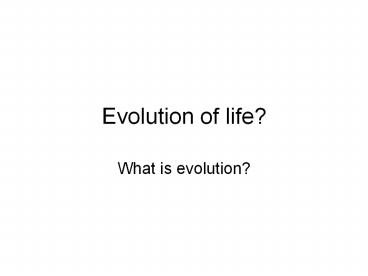Evolution of life? PowerPoint PPT Presentation
1 / 17
Title: Evolution of life?
1
Evolution of life?
- What is evolution?
2
What are the main ideas of the following
Scientists about the evolution of life?
- Aristotle
- Lamarck
- Darwin
- Mendel
- Lysenko
3
Aristotle (384-322 BC)
- "Aristotelianism
- Partly based on Plato's world of ideas
- The species are given categories in nature and
are unchangeable - There are only variation in mature and perfection
of individuals - The only development is the mature of each
individual where the aim is to reach perfection
which is given in the ideal types of the species
4
Aristotles epigenesis I.
- All living creatures, whether they swim, or walk,
or fly, and whether they come into the world with
the form of an animal or of an egg, are
engendered in the same way. - Concept of epigenesis and that in the embryo,
more generalized structures appear before the
more specialized ones. - Epigenesis was one correct idea of Aristotle that
was often discarded.
5
Aristotles epigenesis II.
- His concepts of heredity were even sounder than
Darwin's (!) - Darwin believed in pangenesis (gemmules from all
parts of the body migrate to the semen and
account for paternal characteristics). - This was an old idea that Aristotle had refuted
by fairly sound reasoning, among them - children sometimes resemble distant relatives
more than their parents. This couldn't occur if
the genetic particles were obtained by direct
transmission. - children of mutilated/crippled parents do not
display these mutilations - both male AND female contribute to the
characteristics of the offspring.
6
Jean-Baptiste de Monet, chevalier de Lamarck
(1744-1829)
- "Lamarckism
- French enlightenment
- Naturalist and pre-Darwinian evolutionist
- Studied fossils and invertebrates
- Species change over time by adapting to new
environments - Parents pass their traits on to their offspring
- If an organ is used, it will become stronger,
and if it is not used, it will weaken and may
disappear in future generations - He postulated that acquired characters can be
inherited by future generations
7
Charles Robert Darwin (1809-1882)
- Natural selection" / "Darwinism
- By variation in the population there is an
adaption to the environment through a natural
selection of acquired characters represented in
the variation of the species - Darwin's concepts of heredity were that gemmules
from all parts of the body migrate to the semen
and account for paternal characteristics - Evolution purely mechanistic process
8
Gregor Mendel (1822-1884)
- Mendelian genetics
- His principle of factorial inheritance and the
quantitative investigation of single characters
have provided the basis for modern genetics.
Recognition came many years after his death, when
his key article, Experiments with plant hybrids
(1866), was discovered.
9
The major insights attributed to Mendel are often
summarized in two "laws"
- Principle of Segregation
- observable traits are passed down to offspring
via (discrete, non-blending) particles, one from
each parent. - Principle of Independent Assortment
- the particles (later dubbed genes by American
geneticist T. H. Morgan) from each parent are
equally likely to be passed down to offspring.
10
T. H. Morgan 1866-1945
- Through study of Drosophila
- Made an elegant proof that the chromosomes are
indeed the bearers of the hereditary factors or
genes as they are now known
11
Trofim Denisovich Lysenko (1898-1976)
- Lysenkoism
- developed a doctrine, compounded of Darwinism and
the work of Michurin, that heredity can be
changed by good husbandry. - As director of the Institute of Genetics of the
Soviet Academy of Sciences (194065), he declared
the accepted Mendelian theory erroneous, and
ruthlessly silenced any Soviet geneticists who
opposed him. - He was dismissed by Khrushchev in 1965, having
gravely hampered scientific and agricultural
progress in the USSR.
12
James Watson 1962- Francis Crick 1916-2004
- Figured out the structure of deoxyribonucleic
acid, DNA. - And that structure a "double helix" that can
"unzip" to make copies of itself confirmed
suspicions that DNA carries life's hereditary
information.
13
Discussion questions
- What is evolution? Explain and exemplify!
- Does evolution have an aim?
- Does evolution have a purpose?
14
Modern view on evolution
- Our very best evidence indicates that, in
reality, all species in this world have equal
lengths of evolutionary history. - The differences are the result of coincidence in
the pathways evolutionary movement takes. - Evolution is ultimately about diversity, not
about progress and without purpose or aim
15
(No Transcript)
16
(No Transcript)
17
(No Transcript)

